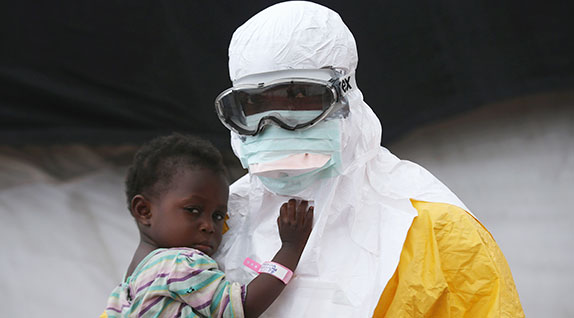 John Moore/Getty Images
John Moore/Getty Images
Article
The whirlwind of 2014’s tumultuous events deserves a comprehensive examination—but its true importance only becomes clear when placed into the context of history.
Learn the why behind the headlines.
Subscribe to the Real Truth for FREE news and analysis.
Subscribe NowThe year 2014 was one of anniversaries. On day 1 following the calendar switch, Europeans celebrated the 15th anniversary of the debut of their national currency, the euro. Two months later on March 11, Spain memorialized the 10th anniversary of the al-Qaida-perpetrated Madrid train bombings that killed 191 people.
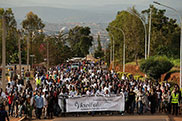 Ahmad Al-Rubaye/AFP/Getty Images
Ahmad Al-Rubaye/AFP/Getty ImagesApril brought the 20th anniversary since the start of the Rwandan genocide and the end of apartheid in South Africa while June brought the 25th anniversary of the Tiananmen Square massacre and what marked perhaps the largest commemoration of all: 100 years since the shooting of Archduke Franz Ferdinand of Austria-Hungary. This event is credited with igniting World War I.
In preparation for this anniversary, military memorials were erected, citizens displayed symbols of national pride, and editorials about ferocious battles filled papers. Unsung heroes graced newspaper covers around the world—their black-and-white images reminding future generations to never forget their sacrifice.
The rest of the year included three other important commemorations: the 75th anniversary of the start of World War II, the 25th anniversary of the Berlin Wall falling, and the 10th anniversary of the tsunami off Thailand’s coast that killed 250,000 from 14 countries.
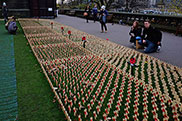 Jeff J. Mitchell/Getty Images
Jeff J. Mitchell/Getty ImagesThe year was not all somber, though. It also brought incredible advances. Scientists discovered a new subatomic particle, an unmanned spaceship landed on a comet for the first time, and water was found on Enceladus, one of Saturn’s moons. Also, a human cell was cloned for the first time in an effort to cure certain diseases, and a prosthetic hand helped an amputee regain his sense of touch.
Still, these amazing discoveries could not transcend the fact that even as the anniversary of the Berlin Wall’s collapse arrived, Cold-War-style tensions escalated between the West and Russia once again. By the time the anniversary of WWI rolled around a military coup had occurred in Thailand, a mudslide killed thousands in Afghanistan, and the terrorist group Boko Haram executed 300 people in Nigeria. Instead of Rwandans dying, thousands of Christians in Iraq died this year in murderous pursuits by the Islamic terrorist organization ISIS and it was announced that more than 10,000 children have perished since the start of Syria’s years-long civil war.
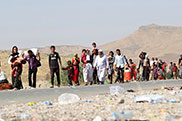 Ahmad Al-Rubaye/AFP/Getty Images
Ahmad Al-Rubaye/AFP/Getty ImagesAnniversaries usually signal an achievement of long-lasting success. They are supposed to be a time for us to remember and examine our actions. Given this, how much should we really be celebrating?
“The human record is littered with lessons unlearned,” historian David Kennedy told USA Today in an article titled “3 Important Lessons Learned from World War I.”
If indeed, “The past offers us a rich database from which we can learn, in order that we may keep succeeding,” as noted civilization expert Jared Diamond stated in his book Collapse, then what have we learned this year? Is man succeeding, or is he barely keeping his head above water as he struggles to tread in the fast-moving current? What can we tell our children, grandchildren and those who will come after us about the legacy we left behind in 2014?
Starting in January, events seemed to portend that it would be another rocky year. But no one fully expected the types of problems that seemed to reappear from out of the blue, making us stop dead in our tracks and ask: how can we stop the cycle? How can we better glean wisdom from a “history littered with lessons unlearned”?
Resurgence 1: Cold War Brinkmanship
At the beginning of the year, bellicose rumblings from Russia brought Cold War memories flooding back. For the first time since the 1980s, a Russian warship docked in a Cuban harbor. Elsewhere around the world, Russian President Vladimir Putin sponsored war games.
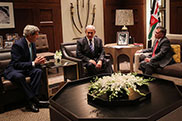 David Buimovitch/AFP/Getty Images
David Buimovitch/AFP/Getty ImagesBusinessweek reported, “An interactive map in the report [from the European Leadership Network titled “Dangerous Brinkmanship: Close Military Encounters Between Russia and the West in 2014”] describes nearly 40 ‘sensitive incidents’ over the past eight months, most in Europe.”
The outlet continued: “…other incidents took place thousands of miles away. For example, Russian bombers in the Labrador Sea off the coast of Canada practiced cruise-missile strikes against the U.S. in early September. Also in September, Russian military jets made repeated incursions into U.S. and Canadian air-defense zones in the Arctic. Last spring, a Russian military plane was spotted 50 miles off the coast of California, the closest such approach since the Cold War.”
To the disdain of Western powers, Russia also continued to support Syrian President Bashar al-Assad, back Iran’s nuclear program, augment trade with China, and assert dominance over Ukraine.
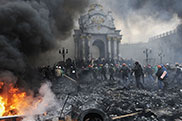 Louisa Gouliamaki/AFP/Getty Images
Louisa Gouliamaki/AFP/Getty Images“Ukraine’s most prolonged and deadly crisis since its post-Soviet independence began as a protest against the government dropping plans to forge closer trade ties with the European Union, and has since spurred escalating tensions between Russia and Western powers,” the Council on Foreign Relations reported. “The crisis stems from more than twenty years of weak governance, a lopsided economy dominated by oligarchs, heavy reliance on Russia, and sharp differences between Ukraine’s linguistically, religiously, and ethnically distinct eastern and western regions.”
The situation with the Ukraine resulted in the most deaths since the nation gained its independence. It has angered Russia, which planned to incorporate Ukraine into its Eurasian Union, set to meet for the first time in January 2015.
Resurgence 2: Terrorist Attacks
In the Middle East, terrorism abounded. In particular, the Sunni extremist organization ISIS (Islamic State of Iraq and Syria), replaced al-Qaida as the most fearsome terrorist group of 2014. The two organizations later agreed to join forces.
Since declaring its caliphate status in June, ISIS has recruited thousands of fighters to capture towns in Iraq. It has forced over 800,000 to flee their homes, enslaved and sexually abused many, plundered vast sums of money from Iraqi banks, and demanded that citizens convert to the Muslim religion or face death. More than 1,000 captured Iraqi civilians and hundreds of war prisoners have been executed or beheaded, including a number of international journalists and foreign aid workers.
Such brutal forms of Islamic terrorism were not just felt in the Middle East, but overseas as well. In Oklahoma, an Islamic man beheaded a coworker. For the first time in its almost 150-year history, Canada also endured this scourge when Islamic terrorists killed two soldiers over a three-day period at historically significant areas. After killing one soldier, one of the terrorists stormed the Parliament building in Ottawa.
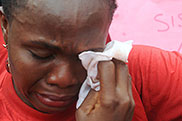 Pius Utomi Ekpei/AFP/Getty Images
Pius Utomi Ekpei/AFP/Getty ImagesIn Nigeria, Islamic terror group Boko Haram strengthened its presence. Throughout the year, it expanded its sphere of influence to include two dozen cities and abducted over 200 school girls. Human Rights Watch reported that the militants killed 2,000-plus civilians in the first half of 2014 alone.
Conflict also continued between Israelis and Palestinians. While the two are always at odds, the latest summer conflict escalated quickly into the first continuous armed period of unrest since 2006 when Hamas became Gaza’s dominant political party. At that time, the Israeli government immediately mandated that all settlements and military presence in the area be pulled back.
The increasing violence prompted urgent calls for peace talks, with Egypt and the European Union becoming involved. Israel’s relations with the United States also became even more strained.
Israel and Hamas shifted between heavy fighting and humanitarian ceasefires for a period of seven weeks, until a final ceasefire on August 26.
“It was only a few months ago that [Benjamin] Netanyahu talked of a ‘new horizon’ in the Middle East, saying the threat from Islamic State meant that countries like Saudi Arabia, Jordan and Egypt shared an interest with Israel in defeating Islamist extremism,” Reuters reported.
“Now, however, with Jordan having withdrawn its ambassador and Egypt on edge about developments at the Noble Sanctuary, which contains al-Aqsa mosque and the Dome of the Rock, that new horizon is starting to look distant and cloudy.”
Resurgence 3: Reemerging Diseases
One of the biggest stories of the year was Ebola, which reappeared with a vengeance for the first time in 20 years. The deadly virus first resurfaced in a two-year-old Guinean boy. Soon, it had taken the lives of his mother, sister and grandmother, and began spreading through neighboring Liberia and Sierra Leone.
“By late March, Ebola cases were cropping up hundreds of miles away on the Atlantic coast in Conakry, Guinea’s congested capital, with a population of 1.7 million,” The Wall Street Journal reported. “The disease had also spread into Liberia, and then Sierra Leone, as nurses who treated the sick and villagers who attended their funerals all brought the virus into their homes and workplaces, sparking chain reactions.”
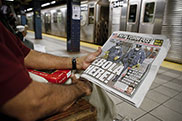 Marco Longari/AFP/Getty Images
Marco Longari/AFP/Getty ImagesRiots broke out in treatment centers as residents in Sierra Leone blamed the government for the spread. At one point, the government shut down the country for three full days to stop the virus from spreading and quarantined almost a third of the nation’s six million people.
By July, the disease reached Nigeria. By August, Senegal and Saudi Arabia. In September, it reached the shores of the U.S. and led to the death of one Liberian patient as well as the quarantine of several nurses who had contact with him. While the nurses survived, several other healthcare workers returning from the area were also put into quarantine and the country became increasingly concerned about the potential spread, urging the closure of the border.
In October, the Democratic Republic of Congo confirmed that 49 people had died from Ebola and Mali had its first case. In the same month, a Sudanese man who had been treated in Germany died and a nurse contracted Ebola from missionaries returning to Spain from West Africa.
According to the World Health Organization, as of this writing, there have been 14,098 reported cases of Ebola with 5,160 reported deaths.
Yet Ebola was not the only disease to resurface. Others included polio, whooping cough, Lassa fever, measles and bird flu.
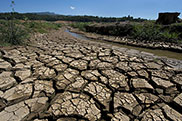 Nelson Almeida/AFP/Getty Images
Nelson Almeida/AFP/Getty Images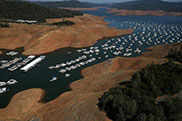 Justin Sullivan/Getty Images
Justin Sullivan/Getty ImagesResurgence 4: Massive Drought
Drought not seen since the Dust Bowl of the 1930s took center stage in the U.S., with more than 50 percent of California, one of the leading producers of fruits and vegetables in the world, combating it. Wells ran dry, livestock died, orchards shriveled, and many were forced to rely on emergency personnel for potable water.
The dry conditions even led to a season of wildfires that sparked “firenadoes” in the state.
In addition to California, the entire Western U.S. saw widespread drought. Ranchers from Montana to Texas reduced herds and livestock prices skyrocketed.
The possibility that millions could migrate east as a result of changes to the climate, which was posited by a study released this year, suddenly did not seem like such a farfetched idea. The fact that this already happened during the 1930s—when farmers were forced to abandon their land due to massive dust storms, heat and dearth—only served to strengthen the argument.
Worldwide, Brazil and Kenya also posted unprecedented droughts, both of which authorities are concerned could have serious consequences in the year ahead.
Resurgence 5: Religious Renewal
On the religious front, the pope stole almost all headlines. Nicknamed the “superpope” early in the year and called the Catholic Church Inc.’s new “CEO,” Pope Francis busied himself with making sweeping changes throughout the church and dramatic announcements to the public.
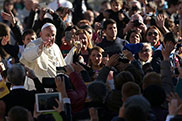 Franco Origlia/Getty Images
Franco Origlia/Getty Images The constant stream of headline-worthy news said it all—usually furthering the pope’s mission to be more inclusive. In January, an Associated Press article had the title “Pope Francis says women should play expanded role in Church.” Later in the month, the news organization noted that pro-pope graffiti was popping up around the Vatican. It stated, “Francis has charmed the masses with his simplicity and message of helping the poor, even as he has cracked down on Vatican waste and corruption.”
The Washington Post noted a few months later that Francis was working hard to heal schisms among Catholics globally, especially those who have felt excluded. This has included atheists, Muslims and homosexuals: “He has chosen inclusive language, has played down the importance of following the hierarchy and has warned against the church locking itself up ‘in small-minded rules.’”
Then in May, Francis inserted himself into the Middle East peace process by inviting Israeli and Palestinian leaders to the Vatican.
He has also been vocal about global affairs by decrying capitalism and youth unemployment.
A Malta Independent article title summed up his message: “Pope Francis claims global economy is close to collapse and describes youth unemployment rates as an ‘atrocity.’”
Francis continued to shake things up when he married 20 couples who had been living together before the ceremony. He directed those in the church to stop using terms like “shacking up” and “living in sin.”
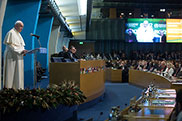 Gregorio Borgia/AFP/Getty Images
Gregorio Borgia/AFP/Getty ImagesThroughout the year, the pope persistently focused on the spiritual realm. An October 29 AP article reported: “Francis has demonstrated an unusually vivid concern about the devil, more than his predecessors, in a reflection both of his Jesuit spirituality and his Latin American roots. This week he sent a message to the International Association of Exorcists, praising the work of exorcists for ‘showing the church’s love and welcome toward those who suffer from the devil’s work.’ Earlier this year, the Vatican granted the association legal recognition in a sign of Francis’ belief that the world needs more exorcists for the increasing number of people seeking to be liberated from their demons.”
In addition, Francis has said that the devil is behind divisions among Christian denominations and that everyone has a guardian angel and should listen to it.
Such a vocal pope—one who inserts himself into the worlds of politics, finance and society—has caught the world by surprise. Yet this is just another resurgence, as the Vatican returns to the historical role that it once held in Europe and globally.
Important Set Up
Recall historian David Kennedy’s observation: “The human record is littered with lessons unlearned.” Throughout 2015, it will be crucial to pay attention to world events.
Again, history can be a guide. The Economist drew many similarities between global conditions at the time of WWI: “The memory of the horrors unleashed a century ago makes leaders less likely to stumble into war today. So does the explosive power of a modern conflagration: the threat of a nuclear holocaust is a powerful brake on the reckless escalation that dispatched a generation of young men into the trenches.”
The magazine continued: “Yet the parallels remain troubling. The United States is Britain, the superpower on the wane, unable to guarantee global security. Its main trading partner, China, plays the part of Germany, a new economic power bristling with nationalist indignation and building up its armed forces rapidly. Modern Japan is France, an ally of the retreating hegemon and a declining regional power. The parallels are not exact—China lacks the Kaiser’s territorial ambitions and America’s defence budget is far more impressive than imperial Britain’s—but they are close enough for the world to be on its guard.
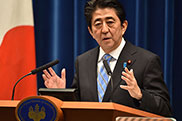 Kazuhiro Nogi/AFP/Getty Images
Kazuhiro Nogi/AFP/Getty Images“Which, by and large, it is not. The most troubling similarity between 1914 and now is complacency. Businesspeople today are like businesspeople then: too busy making money to notice the serpents flickering at the bottom of their trading screens. Politicians are playing with nationalism just as they did 100 years ago. China’s leaders whip up Japanophobia, using it as cover for economic reforms, while Shinzo Abe stirs Japanese nationalism for similar reasons. India [elected] Narendra Modi, a Hindu nationalist who refuses to atone for a pogrom against Muslims in the state he runs and who would have his finger on the button of a potential nuclear conflict with his Muslim neighbours in Pakistan. Vladimir Putin has been content to watch Syria rip itself apart. And the European Union, which came together in reaction to the bloodshed of the 20th century, is looking more fractious and riven by incipient nationalism than at any point since its formation.”
You cannot afford to miss reading The Real Truth throughout the next year. Its in-depth writing will enable you to understand all that is occurring in the world and help you to never forget the lessons of the past.


